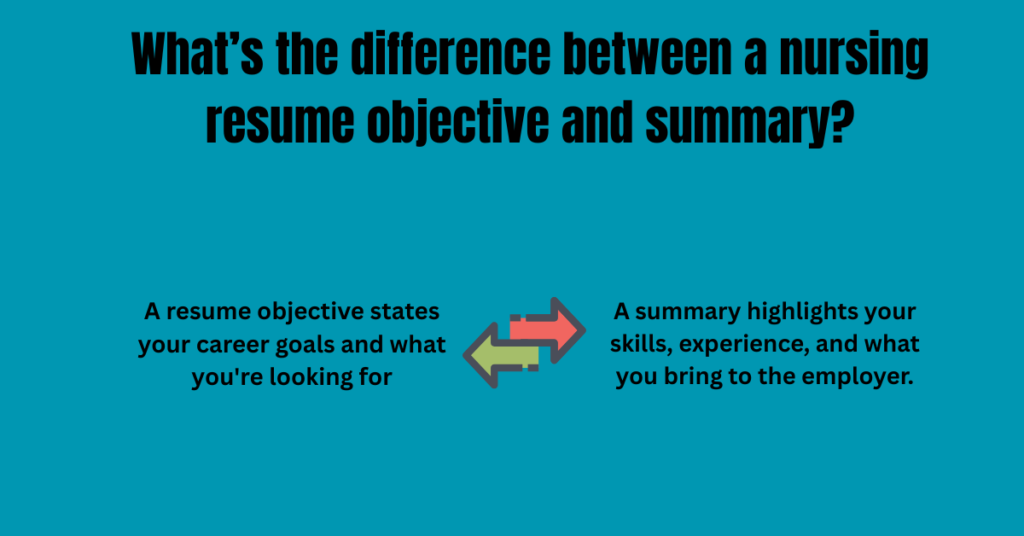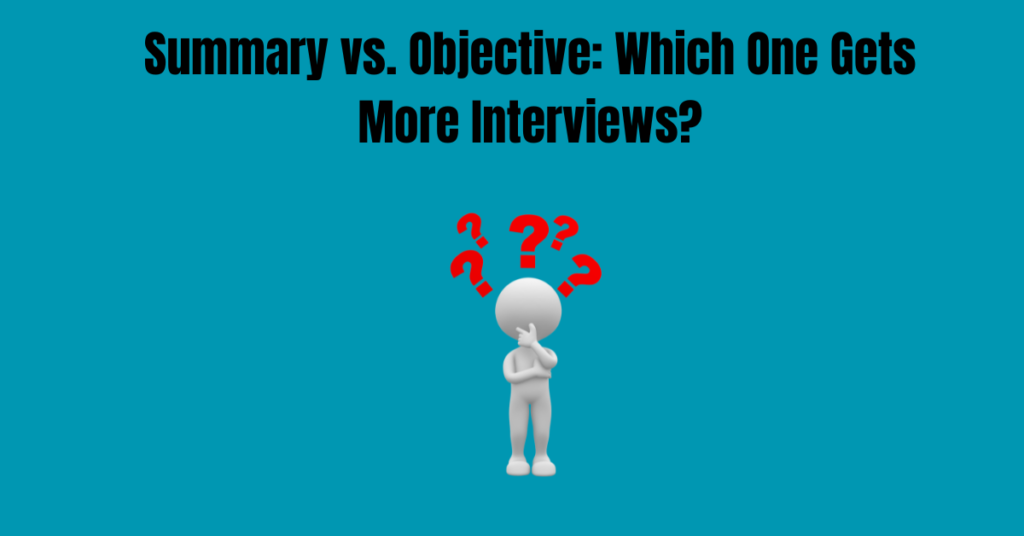I was on a coaching call with Erin, a new nursing graduate, when she sighed and said, “Everyone keeps saying I need a resume summary. But then my classmate said objectives are better for new grads. I don’t know what to use. I just want to get hired.”
I get that question all the time.
So let me clear it up for you in the most honest, down-to-earth way possible.
If you’ve ever asked yourself, “Do I need a resume objective or a summary? And what’s the difference anyway?” — you’re in exactly the right place. In this guide, we’ll break down the real difference between the two and answer the big question: Nursing Resume Objective vs Summary: Which One Gets More Interviews?
This guide will also walk you through:
- What a nursing resume objective is (and when to use one)
- What a nursing resume summary is (and who it works for)
- The pros, cons, and real examples
- And how to pick the right one for you
Let’s start with the basics.

What’s the difference between a nursing resume objective and summary?
A resume objective states your career goals and what you’re looking for. A summary highlights your skills, experience, and what you bring to the employer.
What Is a Nursing Resume Objective?
A resume objective is a short 2–3 sentence statement at the top of your resume where you share what kind of job you’re seeking and what you hope to achieve.
Think of it like: “Hi! I’m just getting started, and here’s what I want to do.”
It works best if you’re:
- A new graduate
- Switching careers
- Re-entering the workforce
Example for new grad nurse:
“Motivated new RN graduate seeking a position in a fast-paced hospital environment. Committed to delivering compassionate care and building strong patient relationships.”
Example for career changer:
“Former EMT turned registered nurse eager to apply emergency care experience in a med-surg setting. Passionate about patient safety and interdisciplinary teamwork.”
When to Use a Resume Objective
Use an objective if you don’t have much relevant experience yet but want to show where you’re heading.
It helps the employer see your direction and ambition.
It also gives you a chance to show personality and passion — which absolutely matters in nursing.
Personally? I often recommend objectives to:
- New grads
- Nurses returning to work after a gap
- Professionals moving from tech, EMS, caregiving, or other fields into nursing
What Is a Nursing Resume Summary?
A resume summary (aka professional summary) is a brief statement that focuses on your qualifications, certifications, years of experience, and what you bring to the role.
Think of it like: “Here’s a quick snapshot of what I’ve done and what makes me valuable.”
It works best if you’re:
- An experienced nurse
- Applying for a specialized role (ICU, dialysis, pediatrics, etc.)
- Seeking a promotion or leadership role
Example:
“Patient-focused RN with 5+ years of experience in critical care settings. Skilled in emergency interventions, medication administration, and patient education. ACLS and BLS certified.”

Summary vs. Objective: Which One Gets More Interviews?
That depends on who you are and what you’re applying for.
If you’re a new grad or career changer: use an objective. It helps explain your goals.
If you have relevant experience: go with a summary. It gives a quick highlight reel of what you offer.
Hiring managers are scanning fast. They want to know:
- Who are you?
- What can you do?
- Are you a good fit?
Give them what they need. Quickly. Clearly.
Coaching Example: When I Helped Taylor Choose
Taylor was a recent nursing grad applying to pediatric nurse jobs.
She had a little volunteer experience, good grades, and a huge heart — but wasn’t sure if that was enough.
Her first resume had a generic summary: “Hard-working nurse seeking job in a medical setting.”
We rewrote it as an objective: “Compassionate nursing graduate seeking a pediatric nurse role where I can apply clinical training, patient education skills, and a deep passion for child-centered care.”
She got three callbacks within two weeks.
✈️ Crafting a Resume for a Specialized Nursing Role?
Whether you’re on the move, working in-home settings, or focused on pediatric care, your resume should reflect your unique strengths.
🧳 Explore our Travel Nurse Resume Format, Skills, and Examples to land assignments fast
🏠 Need a home health role? Read The Ultimate Home Health Nurse Resume Guide to stand out
👶 Specializing in pediatrics? Use this proven Pediatric Nurse Resume Template for 2025
How to Decide What’s Right for You
Ask yourself:
- Are you experienced in the role you’re applying for? → Use a summary
- Are you starting out, pivoting careers, or re-entering? → Use an objective
- Want to quickly show off years of experience + certs? → Summary
- Want to express passion and purpose? → Objective
Still unsure? It’s okay to test both! Send out one version of each and see which gets more traction.
LSI Examples to Make Your Resume Pop
Want to make your summary or objective stand out? Use keywords hiring managers actually search for.
Here are a few:
- nursing resume objective examples
- resume summary for experienced nurse
- new grad nurse resume objective
- best nursing resume summary
- how to write nursing resume summary
- resume summary for critical care nurse
Pro Writing Tips for Both Options
For objectives:
- Be specific about the role or setting you want (ICU, peds, etc.)
- Show passion, not fluff
- Keep it to 2–3 short sentences
For summaries:
- Use numbers (“5+ years in emergency care”)
- Add certifications (“BLS, ACLS”)
- Mention specialties or results (“reduced ER wait times by 15%”)
FAQs Nursing Resume Objective vs Summary
Q: What’s the difference between a nursing resume objective and a summary?
A: A resume objective focuses on your goals. A summary shows your experience and what you offer the employer.
Q: When should I use a resume objective instead of a summary?
A: Use an objective if you’re a new grad, career changer, or have limited experience.
Q: Should I include both an objective and summary?
A: No. It’s better to choose one. Including both can feel repetitive and cluttered.
Q: What’s better for a new grad nurse: objective or summary?
A: An objective is usually better. It gives you space to show enthusiasm and direction.
Q: What makes a great nursing resume summary?
A: It highlights your experience, skills, and certifications in 2–3 sentences tailored to the role.
What Experts Say
According to jobscan, resume objectives are best for entry-level candidates and summaries are more impactful for experienced professionals.
That aligns exactly with what I’ve seen coaching 300+ clients.
Your Story Matters
Choosing between a resume objective and summary isn’t about following trends. It’s about choosing the format that tells your story best.
Whether you’re a fresh grad just starting out or a seasoned pro shifting into a new specialty, your resume should reflect where you are and where you’re going.
If you’ve got heart, drive, and a desire to grow — you’re already more qualified than you think.
Want a head start? Build and Download Your free resume Today. It’s clean, proven, and built to help leaders like you get seen.
You’ve got this. And I’m right here cheering you on.




Pingback: Resume for Nurses Applying Abroad: Real Tips That Actually Work - Best Resume Creator